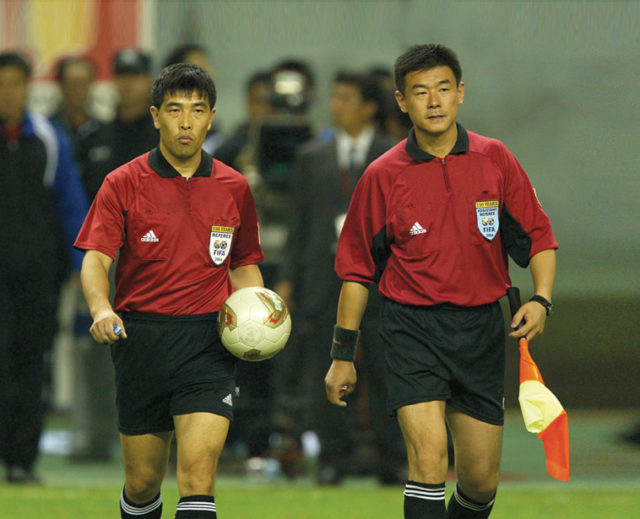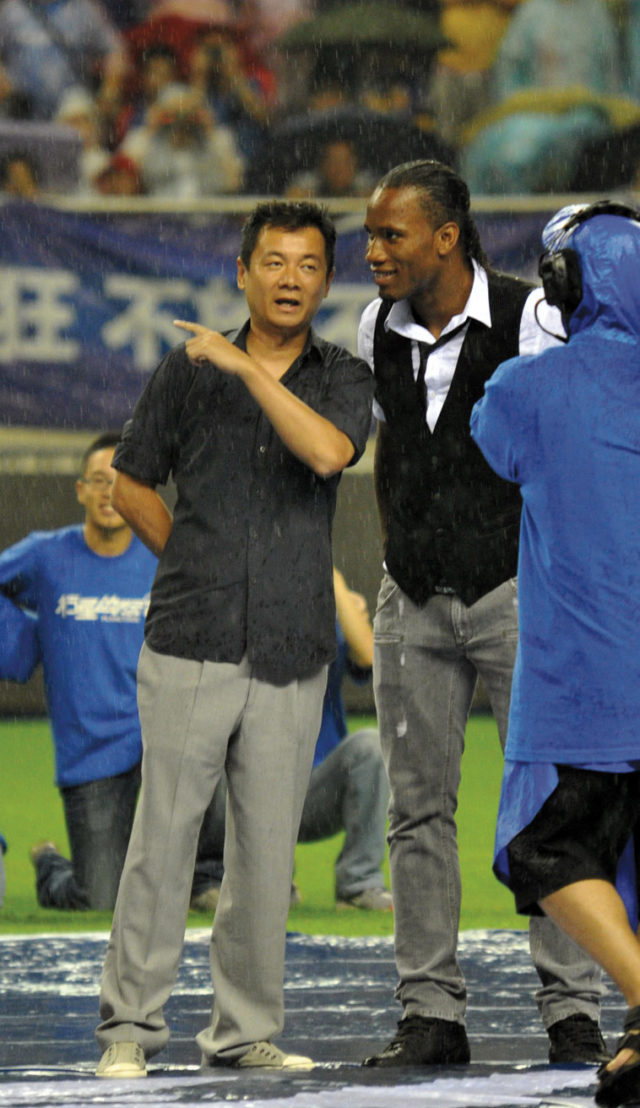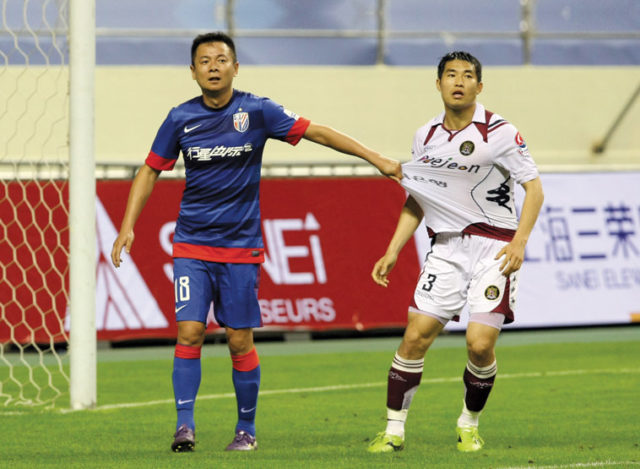A Dagger to the Heart
On Monday 17 June 2013, the front page of Nanjing’s Oriental Guardian (Dongfang weibao 东方卫报) described the latest defeat of China’s national football (soccer) team as ‘a dagger deep into the heart of every Chinese football fan’ (xiang yiba jiandao shenshendi cetong meiyige qiumide xin 像一把尖刀深深地刺痛每一个球迷的心). The Oriental Guardian’s hyperbolic language was indicative of the visceral response engendered by the embarrassing loss. The match in question was a friendly against Thailand held at the Olympic Sports Stadium in Hefei, capital of Anhui province. Having lost two home matches against Uzbekistan and Holland earlier in the month, China was expected to perform better against a Thai team composed mostly of young and inexperienced players. Instead, in front of a crowd of around 20,000 fans, Thailand handed China a drubbing of five goals to one.
After the game, a crowd of angry fans besieged the bus of the Chinese team and chanted for the coach to be sacked. They also shouted ‘Disband the Chinese Football Association!’ (Zuxie jiesan! 足协解散!) and ‘Disband the national team!’ (Guozu jiesan! 国足解散!). The crowd grew violent and one hundred people were reportedly injured. Over the following two days, the editorials in Oriental Guardian and other newspapers across China voiced despair at the loss, which was seen as a national disgrace.
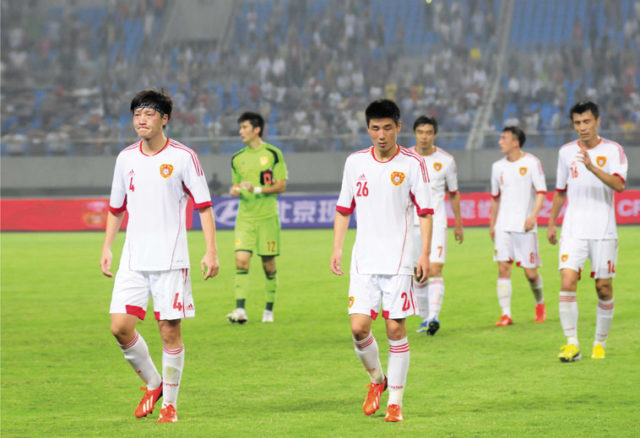
Members of the Chinese national football team walk dejectedly off the field after their 1-5 drubbing by a young Thai team in Hefei, Anhui province, 15 June 2013.
Source: ImagineChina
More than a Game
The Oriental Guardian editorial pointed out what every Chinese football fan knows all too well: the embarrassing defeat in Hefei was due to a lot more than just a lack of sporting skill. Apart from the corruption and mismanagement that have plagued Chinese football for years, cities lack adequate football facilities, and there are no institutions to nurture talent or encourage grassroots teams that in other countries form the basis of a football culture. In 2011, the Chinese Football Association (CFA) — the official body with oversight of the game — had a mere 7,000 registered young players aged thirteen to eighteen years on its books. Japan, by contrast, had 600,000, and France had 1.46 million.
Problems arose with the advent of professional football in China in the 1990s. The first professional national league was set up in 1994, composed of clubs largely run as commercial ventures and with lavish sponsorships from state-owned enterprises. Initially, player salaries were low, but they began to rise as the clubs, buffered by a state-funded safety net, took on more debt. By 1998, the average attendance per game hovered at around 20,000.
Growth then began to stall as fans started to question the standards of both the playing and the refereeing, as well as the commitment of players to the game. In 1996, the president of the CFA publicly berated the national team for not training hard enough and for gambling, drinking and smoking. Insiders muttered about bribery and match-fixing run by gambling syndicates. Gradually, players, coaches, referees and officials alike were dragged into corrupt dealings; even spots on the Chinese national team were up for sale.
By 2000, corruption was so endemic that some sponsors withdrew support in disgust — the privately-owned auto manufacturer Geely, for example, ceased supporting a club in Guangzhou. Accusations of corruption began to surface in public in 2001, when Chen Peide — the head of the Zhejiang Sports Bureau — publicly lambasted the bribing of referees and the influence of betting syndicates. Yet Chen’s condemnation of these corrosive practices resulted in only the meekest of crackdowns. The CFA — whose senior leaders were deeply implicated in the match-fixing and bribery — was given the problematic task of investigating itself. One lone referee was sentenced to a ten-year jail term for taking bribes in 2003 — he was the only one who had confessed.
In 2004, the professional league reorganised itself as the ‘Chinese Super League’ (Zhongguo zuqiu chaoji liansai 中国足球超级联赛,or Zhongchaolian 中超联 for short), consisting of twelve teams (later expanded to sixteen). But the reorganisation did nothing to address the corruption plaguing the game, and it showed: the inaugural season of the Chinese Super League saw the lowest-ever average attendance per game of little more than 10,000 people. Chinese football seemed to be in a terminal state of decline. This was typified by the national team’s abysmal showing at the 2002 World Cup held in South Korea and Japan (the only World Cup China has ever qualified for). Riding a wave of home support, South Korea, with a population of less than fifty million, went all the way to the semi-finals; China failed to score a single goal.
In November 2008, the state broadcaster China Central Television (CCTV) announced a total ban on broadcasting Chinese professional league matches, accusing the players of ‘lacking professional ethics’. With a few exceptions, the ban remained in force until the start of the 2012 season. A farcical instance of the dire lack of professional ethics occurred in September 2009 during a game between the second division teams Sichuan Zhigu and Hailifeng from Qingdao. Near the end of the match, the president of the Hailifeng club ordered his players to concede a goal immediately to ensure that he would take in more from a bet he had placed on the game. What ensued was a comedy of incompetence as the players exerted themselves but ultimately failed to score an own goal. The whole fiasco, subsequently dubbed ‘Chip-shot gate’ (diaoshemen 吊射门) in the media, played out in full view of the fans.
The media regularly raised allegations of match-fixing and bribery of referees, but with the CFA complicit in the criminal acts, nothing changed. By the end of the decade, however, some of the highest-level party officials in China, including then Vice-President Xi Jinping, had voiced grave concern about the state of the game. It was something that happened overseas, however, that jolted the Chinese Ministry of Public Security into action. In 2008, the Interpol office in Singapore issued an arrest warrant for Wang Xin — who was managing Liaoning Guangyuan FC, a Singaporean satellite club of the Chinese Super League club Liaoning FC — for bribery and match-fixing in the city-state. The investigation there turned up evidence that incriminated Wang and others in the Chinese Super League. Wang fled back to China, but his arrest by the police there in April 2009 marked a new crackdown on football corruption in China. One month earlier, a committee comprising twelve ministry-level bodies had been set up with a brief to clean up the game, and this time it would not be a mere formality.
The campaign found a champion in 2010: Wei Di, who had managed aquatic sports in China from 2001 onwards and who was appointed to head the CFA after its previous incumbent was arrested for match-fixing. Wei promised to clean up the game within five years. A series of arrests, trials, fines, expulsions, demotions and jail sentences followed, much of it broadcast on national television. One of the most shocking incidents was the 2010 arrest of China’s most trusted referee, Lu Jun — nicknamed ‘Golden Whistle’ due to his reputation for fairness — on corruption charges. In December 2011, Lu confessed to accepting bribes totaling 710,000 yuan over a four-year period to 2003. The clean-out extended to the top management of the CFA as well as referees, players, coaches and administrators. Clubs found guilty of match-fixing had trophies revoked, had league points deducted or found themselves demoted to a lower league.
By February 2013, thirty-three people — including three former CFA presidents and vice-presidents, ‘Golden Whistle’ and other referees, and four former national team players — were banned from football for life, with some handed jail sentences as well as fines.
Spend It like Beckham
Just a few weeks later, in March 2013, international football superstar David Beckham appeared in Beijing at the invitation of the CFA and (at least according to the South China Morning Post) with the financial support of CCTV, as Chinese football’s new ‘global ambassador’. His fee was not disclosed, but the one thing Chinese football does not lack is ready cash. Real estate companies have been investing some of the profits they have made during the fifteen-year-long real estate boom in football teams: they own nine of the current sixteen clubs in the Chinese Super League. Other club owners include the Tianjin Economic-Technological Development Area, Shandong Electricity Power Cooperation and Moutai — the company that makes the famous firewater of Nixonian toasts.
CCTV started broadcasting Chinese professional games again at the start of the 2012 season, and the average attendance per game reached 18,740 people — the highest level since 2001. The immense financial resources invested in local clubs have improved the prospects for the Chinese Super League to be a viable commercial competitor for global football talent; some of the renowned foreign players and coaches who have since been drawn to China have contributed significantly to rising attendances.
The contrasting fortunes of some of the richest local clubs, however, illustrate the precarious state of the game. The most successful club over the last two years achieved a remarkable transformation in a very short space of time. In 2010, when sponsored by the state-owned Guangzhou Pharmaceutical, Guangzhou GPC was demoted to the second league for taking bribes. Then it was acquired by Evergrande Real Estate Group, which is controlled by billionaire and party stalwart Xu Jiayin. The club won promotion back to the Chinese Super League the next season, and followed that up by winning the season in 2011. In 2012, Guangzhou GPC hired former Italian World Cup-winning coach Marcelo Lippi, successfully defended its title and won the national knockout competition, the CFA Cup, as well.
The story of Shanghai Shenhua, however, another club that attracted huge amounts in sponsorships, provides a stark contrast with Guangzhou Evergrande. In 2007, a billionaire businessman named Zhu Jun acquired a controlling stake in the club. Zhu had made his fortune with his Internet gaming company The9, which held the exclusive Chinese rights for the popular online game World of Warcraft from 2004 to 2009. Soon after acquiring a controlling stake in Shenhua, the forty-something Zhu forced the team manager to pick him in the starting line-up in a friendly match against English Premier League side Liverpool. Zhu lasted only five minutes before he was substituted. But his self-indulgence — described by Wildeastfootball.net, a China-based English-language football blog, as ‘the most cringeworthy event in Chinese football’s rather bulging episodes-to-forget file’ — was characteristic of the brash and overconfident Zhu.
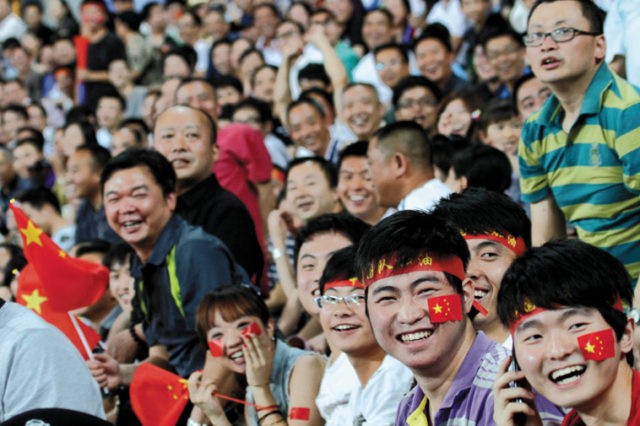
Chinese football fans in Guiyang, Guizhou province, when their national team beat North Korea, June 2011.
Source: ImagineChina
In 2012, Zhu pulled off something of a coup when he managed to sign two high-profile former English Premier League stars: Didier Drogba and Nicolas Anelka. But Shenhua achieved little on the field and failed to attract large crowds, and Zhu went through nine coaches in six seasons. In a bizarre interview he gave to the Financial Times in June 2012, Zhu unwittingly revealed a crucial problem with the way many clubs are run in China when he dismissed the heavy rotation of coaches as nothing abnormal: ‘We change two coaches in one year as we do not have any long-term plan. We’re different from Europe.’ Amid a dispute over unpaid wages, both Anelka and Drogba departed within one season. And in June 2013, Zhu himself appeared to be gone too as the media reported the club’s acquisition by Shanghai Greenland — another real estate company — although later media reports clarified that Greenland was interested in buying the club but had not yet done so.
The instability that continues to plague Shenhua at the time of writing is far from unique. As one foreign player in China told the BBC in 2013, there is a lot of money in China, but also a lot of volatility and not much organisation; a club can change hands, owners or names in the middle of a season. In an interview during his brief stint at Shanghai Shenhua, Nicolas Anelka complained of ‘games behind my back’ that were distracting him from business on the field. Many of the foreign players and coaches currently working in China have expressed concern about the lack of professionalism, skill and commitment among local players. They also bemoan the under-development of youth and amateur football in China.
So if football in China is gradually recovering, it is doing so from a life-threatening disease. The long-term strategy that Zhu Jun so derided is exactly what is needed now for building a sustainable foundation for the development of the game. Yet what has made the failure of Chinese football so toxic is how it has so conspicuously exposed the effects of corruption, which are usually hidden behind an opaque, bureaucratic machinery. It did so in the form of a professional league largely reduced to a sham due to bribery, betting and match-fixing. Consequently, China’s national team struggles to compete even those of far smaller countries such as Thailand. Many Chinese now perceive football to be a shameful blot on the country’s modern sporting record and national reputation; every defeat just adds more misery to an incessant loss of national face. Perhaps David Beckham can help. But from the perspective of the irate crowd after the game in Hefei and other long-suffering fans, it might just be better to disband the national team altogether.


